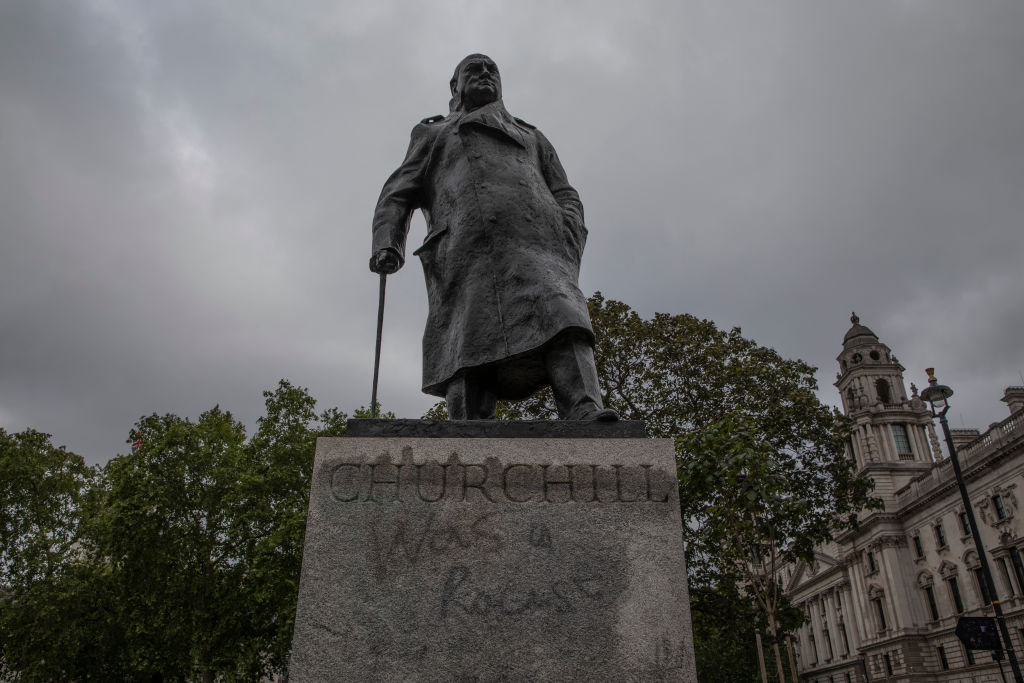It has become a ritual almost as traditional as the Changing of the Guard. During a weekend of mostly peaceful protests, Winston Churchill’s statue in Parliament Square was once again vandalised.
The first recorded defacement of Ivor Roberts-Jones’ imposing rendition of Churchill took place during London’s 2000 May Day anti-capitalist protests. A strip of grass placed on the statue’s head gave the impression it sported a Mohican haircut. James Mitchell, a former soldier in his twenties, also sprayed its mouth with blood-like red paint. Mitchell said he did this because: ‘Churchill was an exponent of capitalism and of imperialism and anti-Semitism. A Tory reactionary vehemently opposed to the emancipation of women and to independence in India’. In a similar vein, this weekend an anonymous Black Lives Matters protestor sprayed on the statue’s plinth that Churchill was a racist.
As with previous defacements – and as tradition demanded – the reaction in the Conservative-leaning press was vituperative. The Daily Express even claimed the statue had been ‘desecrated’. It comes as no surprise that some on the right think Churchill’s statue is a literally sacred thing. But in an apparent break with custom, Labour’s Caroline Flint also described its defacement as an ‘insult’ given Churchill had worked with Clement Attlee to defeat Nazism. In response, James Mills, who used to advise John McDonnell while Shadow Chancellor, suggested that the racist tag was legitimate when he countered that Churchill’s record also included ‘the Tonypandy Massacre, the Black and Tans, gassing the Kurds, hatred of Gandhi and Indian independence.’
Mills’ was a not entirely accurate list of crimes, but it reflected how negatively many on the Labour left regard the former prime minister. Only last week, Jeremy Corbyn criticised Churchill for making anti-Semitic remarks ‘all through his life’. And in 2019, Mills’ former boss declared Churchill to be, overall, a villain rather than a hero due to his role in sending troops to Tonypandy in 1911. Churchill, then a Liberal Home Secretary, certainly ordered soldiers to the district at a time of bitter unrest due to a prolonged miners’ strike, although what followed can by no means be described – as Mills did – as a ‘massacre’. Churchill’s actions nonetheless became the stuff of labour movement legend, which suggested that he had a hatred for miners. This legend was even believed by the hardly left-wing Labour Prime Minister Jim Callaghan. Churchill remains a deeply unpopular figure in South Wales even to this day.
In truth the Labour party has always been ambiguous about Churchill – and in fairness there is much to be ambiguous about. To name but two issues in which he revealed his reactionary tendencies, Churchill’s desire to crush the 1926 General Strike made even some Conservatives uneasy while his opposition to Indian Home Rule in the 1930s put him at odds with his own government. When the Parliament Square statue was first mooted by Conservative backbencher John Tilney in 1968 to memorialise, as he put it, ‘perhaps the greatest leader of this nation and the greatest Parliamentarian for centuries’ Prime Minister Harold Wilson was hardly keen and refused to allocate government funds to pay for it. Other Labour Parliamentarians – especially those from South Wales or with mining backgrounds – wondered if it was necessary, given the number of statues already raised to his memory, including one recently unveiled in the Members’ Lobby in Parliament.
Such attitudes are, however, at odds with what many voters think. Indeed, a survey conducted in 2017 suggested 47 per cent of Britons had a largely positive view of Churchill while 5 per cent had a negative view, an opinion also shared by just 8 per cent of Labour voters. If John McDonnell believed the wartime premier was unpopular with working-class families their number was clearly not as great as he imagined.
Churchill’s continued popularity with accustomed Labour supporters was undoubtedly why, sensing a chance to make a point, a number of ‘Blue Collar’ Conservative MPs sought to clean Churchill’s statue to erase the weekend’s damage. Labour’s attitude to Winston Churchill – and his statue – might not be something that will sway many voters come election time. It is, however, one of those issues that helps signify how in – or out – of touch the party is with those whose support it needs to win back if it is ever to form a government. Given that, it is no surprise that the ever-careful Starmer who is currently reaching out to Labour’s lost voters on LBC and in online discussions has let it be known that, like Flint, he also condemned the vandalism of Churchill’s statue.
Steven Fielding is the author, with Bill Schwarz and Richard Toye, of The Churchill Myths (Oxford University Press, August 2020).






Comments